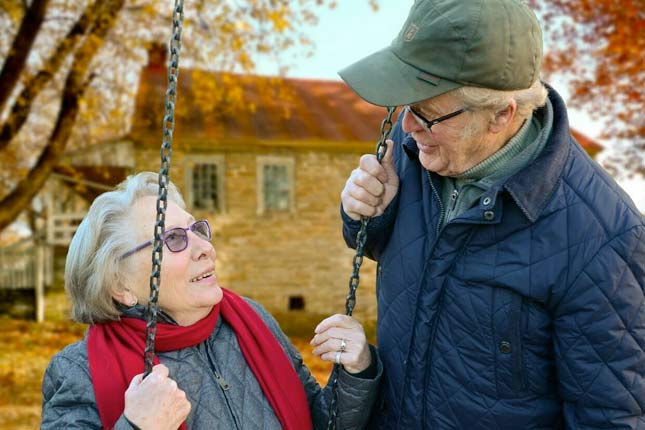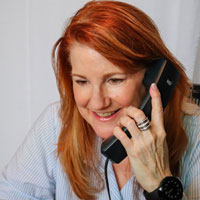
May 27, 2020
I wish we had started sooner – Renee and Alan’s Story
Memory loss is stealthy. We are living longer and we want to remain active, robust. Experiencing some form of memory loss as we age is not uncommon, and it’s not unusual to hide it from family, friends or even our doctor for fear of being judged or labeled. We may not want other family members to worry. In the case of one family caregiver we know – she did not want her grown children to know about their father’s memory issues for fear the couple would have to surrender their home and independence, or even worse be separated from each other. The good news is that there is technology available now that is powerful yet discreet that can help keep families connected with more information about how an older loved one is doing, and when they might need assistance with direct 2-way communication. This means that as we get older we can remain active and independent and our home of choice longer, with the reassurance that our family members know where we are, that we’re in a safe area, or receive an alert if something is awry so we can communicate with them immediately. More peace of mind for family members – who may live in the same home or are across town or country – and for their loved ones.
This brings me to the journey of Renee and her husband, Alan. Renee and Alan have been married for 45 years. They met in Opheim, Montana while he was in the Air Force, fell in love almost immediately, and were married a year later. Upon completing his service, Alan went to school and became a social worker. He worked with children who suffered from child abuse and other forms of neglect. During their marriage they moved several times ─ to Tulsa, and then Los Angeles ─ where Alan worked with youths involved in gangs. So, Alan is a person of strong character and a large heart. His wife, Renee, is too. Eventually they retired to the Big Sky Country of Montana, surrounded by the majestic beauty of the Beartooth and Pryor Mountains.
Their Alzheimer’s journey actually began in 2010, when at age 57 some mild cognitive changes in Alan’s behavior were noted. Understandably, as a relatively young man he was resistant to being further diagnosed and carried on. He loved to read, but unfortunately his ability to read declined until he could no longer read the books he enjoyed. Other symptoms began presenting, with short term memory loss regarding names and places he knew well. In 2017 Sundowning began, and he was diagnosed with Atypical Alzheimer’s Disease.
Prior to his Alzheimer’s diagnosis, Alan was not a recreational walker but with his diagnosis he began taking walks as it helped him control his anxiety, and with Alzheimer’s physical activity is often an important part of treatment protocol. The couple lives in a self-contained subdivision, with one entry and exit. Early on in his walks he would stay on the path that wound mazelike through their neighborhood of 150 homes. Despite being in this safe residential community, the one exit/entrance leads to a very busy and fast two-way highway.
In the past, the subject of acquiring a GPS wearable had been broached because of his frequent walks and Renee’s concern for his welfare – what if he got lost? How would she know where he was or be able to call him, especially since he couldn’t always remember how to answer a cell phone? Alan had refused wearing lanyards and pendants as he didn’t want to wear something stigmatizing. The final straw occurred when he had wandered outside their community entrance, onto the busy road. When she finally found him and got him home, Alan told Renee he thought he was back in Staten Island, his hometown, and looking for a bus stop. As his primary caregiver, Renee was now dealing with something dangerous, stressful and heart-wrenching. Alzheimer’s and dementia study data reports that wandering incidents are unpredictable*, and Alan’s wandering had become more frequent, dangerous and could no longer be ignored. It was imperative to find something Alan would wear for location monitoring and communication with Renee. This time while researching online, his daughter-in-law found the Theora Connect™ wristwatch-style wearable.
Alan liked the wearable, as it’s stylish, lightweight, comfortable and looks like a regular wristwatch. In fact, it is a regular wristwatch with a selectable analog or digital face, but more importantly it’s purpose-built for activity and location monitoring, with an integrated 4G/LTE cellular phone that he can use to call Renee, and she can call him. All Renee had to do was download the free Theora Link™ app to her own smartphone, and after a quick set up, was able to track Alan’s walks, set up Safe Zone geofences so that she is alerted when he does wander out of a safe area. Renee can track his current location via GPS and his location history. Their children can also download the app, and Renee can set them up to be able to have 2-way communications and GPS tracking on their father, too. There is even a Quik Connect™ feature that enables Renee to speak with Alan hands-free via the wristwatch ─ in the event he becomes lost or confused he can still hear her reassuring voice without having to press a button. Using Theora Care monitoring solutions means more peace of mind for Renee while Alan is away, while enabling Alan to continue taking the walks he needs.
There have been several wandering incidents where the watch and smartphone app have been invaluable, but Renee shared one particularly upsetting incident. This past winter, when there was still snow and ice outside, Alan decided he wanted to go for a walk. Renee was able to deter him for a bit but being determined, he insisted and left. She said the Theora Link smartphone app has been invaluable for her in providing peace of mind knowing where he was, while giving him some time to have freedom and control. Renee used the app to track Alan, as he did not go in his usual direction for the walk. From her second-floor window, Renee sometimes could see him but could rely on the smartphone app to tell her where he was located. At one point, Renee looked and saw a man running down the road, and assumed it was one of the construction workers she had seen earlier working down the street. But when she looked at the Theora Link app again, Alan had stopped moving. He remained in the same location. Frantic, when she reached him, she realized it was actually Alan she had seen running down the icy path and he had taken a nasty fall. Paramedics quickly assisted them, and he spent a night in ICU. Had it not been for connection between his Theora Connect wristwatch and her Theora Link smartphone app, this incident – as upsetting as it was – could have been much so much worse in the inclement weather had she not been able to find him. But she was there within minutes of the incident because the app kept her informed.
Renee wanted pass along this message to anyone who is on the Alzheimer’s caregiving journey with a loved one:
“No matter what stage (of Alzheimer’s) the watch is one of the most important items you will ever purchase if your loved one wanders. I put it off because I didn’t want to admit what was happening. It looks like a very stylish watch anyone would wear. It has proven invaluable in locating Alan when he gets a stubborn streak and takes off. I would recommend you buy a Theora Care watch sooner rather than later, for more peace of mind and increased safety for your loved one.”
Thank you, Renee and Alan, for sharing your journey in your efforts to help more caregiving families coping with Alzheimer’s. And thank you both for your service, in the military and as caregiver.
* https://theoracare.com/research-shows-dementia-wandering-is-more-lethal-than-we-thought/

